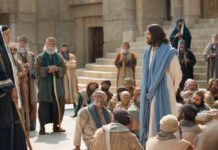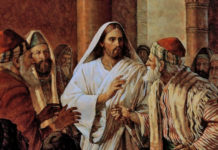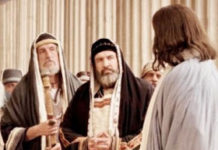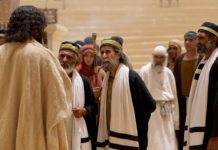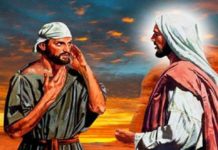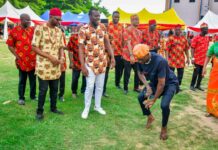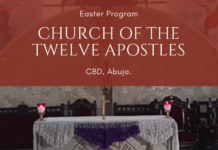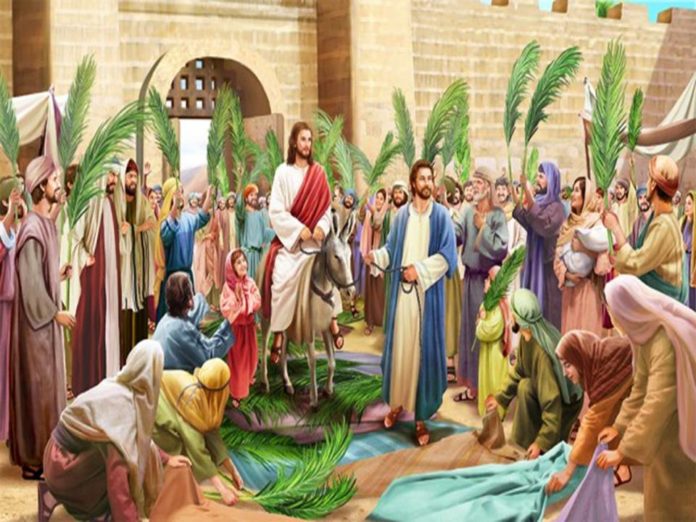FIRST READING
“hid not my face from shame, and I know I shall not be put to shame. ” Third song of the Servant of the Lord.
A reading from the Book of Isaiah (Isaiah 50:4-7)
The Lord God has given me the tongue of those who are taught, that I may know how to sustain with a word him that is weary. Morning by morning he wakens, he wakens my ear to hear as those who are taught. The Lord God has opened my ear, and I was not rebellious, I turned not backward. I gave my back to those who struck me, and my cheeks to those who pulled out the beard; I hid not my face from shame and spitting. For the Lord God helps me; therefore I have not been confounded; therefore I have set my face like a flint, and I know that I shall not be put to shame.
The word of the Lord.
RESPONSORIAL PSALM Ps 22:8-9.17-18a.19-20.23-24 (R. 2a)
R/. My God, my God, why have you forsaken me?
All who see me deride me;
they curl their lips, they toss their heads:
“He trusted in the Lord, let him save him;
let him release him, for in him he delights.” R.
For dogs have surrounded me;
a band of the wicked besets me.
They tear holes in my hands and my feet;
I can count every one of my bones. R.
R/. My God, my God, why have you forsaken me?
They divide my clothing among them,
they cast lots for my robe.
But you, O Lord, do not stay afar off;
my strength, make haste to help me! R.
I will tell of your name to my kin,
and praise you in the midst of the assembly;
“You who fear the Lord, give him praise;
all descendants of Jacob, give him glory;
revere him, all you descendants of Israel.” R.
SECOND READING
“He humbled himself, and God has highly exalted him ”
A reading from the Letter of Saint Paul to the Philippians (Philippians 2:6-11)
Christ Jesus, though he was in the form of God, did not count equality with God a thing to be grasped, but emptied himself, taking the form of a servant, being born in the likeness of men. And being found in human form he humbled himself and became obedient unto death, even death on a cross. Therefore God has highly exalted him and bestowed on him the name which is above every name, that at the name of Jesus every knee should bow, in heaven and on earth and under the earth, and every tongue confess that Jesus Christ is Lord, to the glory of God the Father.
The word of the Lord.
VERSE BEFORE THE GOSPEL Philippians2:8b-9
Glory and praise to you, O Christ. Christ became obedient for us unto death, even death on a cross. Therefore God has highly exalted him: and bestowed on him the name which is above every name. Glory and praise to you, O Christ.
The narrative of the Lords Passion is read without candles and without incense, with no greeting or signing of the book. It is read by a Deacon or, if there is no Deacon, by a Priest. It may also be read by readers, with the part of Christ, if possible, reserved to a Priest. Deacons, but not others, ask for the blessing of the Priest before singing the Passion, as at other times before the Gospel.
GOSPEL (Year B)
In the following Passion narrative: N = narrator, C= Christ, S. = speakers other than Christ.
The Passion of our Lord Jesus Christ according to Mark (Mark 14: 1- 15:47)
N. It was two days before the Passover and the feast of Unleavened Bread. And the chief priests and the scribes were seeking how to arrest Jesus by stealth, and kill him; for they said,
S. “Not during the feast, lest there be a tumult of the people.”
N. And while he was at Bethany in the house of Simon the leper, as he sat at table, a woman came with an alabaster jar of ointment of pure nard, very costly, and she broke the jar and poured it over his head. But there were some who said to themselves indignantly,
S. “Why was the ointment thus wasted? For this ointment might have been sold for more than three hundred denarii, and given to the poor.”
N. And they reproached her. But Jesus said,
S. “Let her alone; why do you trouble her? She has done a beautiful thing to me. For you always have the poor with you, and whenever you will, you can do good to them; but you will not always have me. She has done what she could; she has anointed my body beforehand for burying. And truly, I say to you, wherever the Gospel is preached in the whole world, what she has done will be told in memory of her.”
N. Then Judas Iscariot, who was one of the Twelve, went to the chief priests in order to betray him to them. And when they heard it they were glad, and promised to give him money. And he sought an opportunity to betray him. And on the first day of Unleavened Bread, when they sacrificed the Passover Lamb, his disciples said to him,
S “Where will you have us go and prepare for you to eat the Passover?”
N. And he sent two of his disciples, and said to them,
C. “Go into the city, and a man carrying a jar of water will meet you; follow him, and wherever he enters, say to the householder, ‘The Teacher says, Where is my guest room, where I am to eat the Passover with my disciples?’ And he will show you a large upper room furnished and ready; there prepare for us.”
N. And the disciples set out and went to the city, and found it as he had told them; and they prepared the Passover. And when it was evening he came with the Twelve. And as they were at table eating, Jesus said,
C. “Truly, I say to you, one of you will betray me, one who is eating with me.”
N. They began to be sorrowful, and to say to him one after another,
S. “Is it I?”
N. He said to them,
C. “It is one of the Twelve, one who is dipping bread in the same dish with me. For the Son of man goes as it is written of him, but woe to that man by whom the Son of man is betrayed! It would have been better for that man if he had not been born.”
N. And as they were eating, he took bread, and blessed, and broke it, and gave it to them, and said,
C. “Take; this is my body.”
N. And he took a chalice, and when he had given thanks he gave it to them, and they all drank of it. And he said to them,
C. “This is my blood of the covenant, which is poured out for many. Truly, I say to you, I shall not drink again of the fruit of the vine until that day when I drink it new in the kingdom of God.”
N. And when they had sung a hymn, they went out to the Mount of Olives. And Jesus said to them,
C. “You will all fall away; for it is written, ‘I will strike the shepherd, and the sheep will be scattered. ’ But after I am raised up, I will go before you to Galilee.”
N. Peter said to him,
S. “Even though they all fall away, I will not.”
N. And Jesus said to him,
C “Truly, I say to you, this very night, before the cock crows twice, you will deny me three times.”
N. But he said vehemently,
S. “If I must die with you, I will not deny you.”
N. And they all said the same. And they went to a place which was called Gethsemane; and he said to his disciples,
C. “Sit here, while I pray.”
N. And he took with him Peter and James and John, and began to be greatly distressed and troubled. And he said to them,
C. “My soul is very sorrowful even to death; remain here, and watch.”
N. And going a little farther he fell on the ground and prayed that, if it were possible, the hour might pass from him. And he said,
C. “Abba, Father, all things are possible to you; remove this chalice from me; yet not what I will, but what you will.”
N. And he came and found them sleeping, and he said to Peter,
C. “Simon, are you asleep? Could you not watch one hour? Watch and pray that you may not enter into temptation; the spirit indeed is willing, but the flesh is weak.”
N. And again he went away and prayed, ‘saying the same words. And again he came and found them sleeping, for their eyes were very heavy; and they did not know what to answer him. And he came the third time, and said to them,
C. “Are you still sleeping and taking your rest? It is enough; the hour has come; the Son of man is betrayed into the hands of sinners. Rise, let us be going; see, my betrayed is at hand.”
N. And immediately, while he was still speaking, Judas came, one of the Twelve, and with him a crowd with swords and clubs, from the chief priests and the scribes and the elders. Now the betrayer had given them a sign, saying,
S. “The one I shall kiss is the man; seize him and lead him away safely.”
N. And when he came, he went up to him at once, and said,
S. “Master!”
N. And he kissed him. And they laid hands on him and seized him. But one of those who stood by drew his sword, and struck the slave of the high priest and cut off his ear. And Jesus said to them,
C, “Have you come out as against a robber, with swords and clubs to capture me? Day after day I was with you in the temple teaching, and you did not seize me. But let the Scriptures be fulfilled.”
N. And they all deserted him and fled.
And a young man followed him, with nothing but a linen cloth about his body; and they seized him, but he left the linen cloth and ran away naked.
And they led Jesus to the high priest; and all the chief priests and the elders and the scribes were assembled. And Peter had followed him at a distance, right into the courtyard fifth high priest; and he was sitting with the guards, and warming himself at the fire. Now the chief priests and the whole council sought testimony against Jesus to put him to death; but they found none. For many bore false witness against him, and their witness did not agree. And some stood up and bore false witness against him, saying,
S. “We heard him say, ‘I will destroy this temple that is made with hands, and in three days I will build another, not made with hands. ”’
N. Yet not even so did their testimony agree. And the high priest stood up in their midst, and asked Jesus,
S. “Have you no answer to make? What is it that these men testify against you?”
N. But he was silent and made no answer. Again the high priest asked him,
S. “Are you the Christ, the Son of the Blessed?”
N. And Jesus said,
C. “I am; and you will see the Son of man sitting at the right hand of Power, and coming with the clouds of heaven.”
N. And the high priest tore his clothes, and said,
S. “Why do we still need witnesses? You have heard his blasphemy. What is your decision?”
N. And they all condemned him as deserving death. And some began to spit on him, and to cover his face, and to strike him, saying to him,
S. “Prophesy!”
N. And the guards received him with blows. And as Peter was below in the courtyard, one of the maids of the high priest came; and seeing Peter warming himself, she looked at him. and said,
S. “You also were with the Nazarene, Jesus.”
N. But he denied it, saying,
S. “I neither know nor understand what you mean.”
N. And he went out into the gateway. And the maid saw him, and began again to say to the bystanders,
S. “This man is one of them.”
N. But again he denied it. And after a little while again the bystanders said to Peter,
S. “Certainly you are one of them; for you are a Galilean.”
N. But he began to invoke a curse on himself and to swear,
S. “I do not know this man of whom you speak.”
N. And immediately the cock crowed a second time. And Peter remembered how Jesus had said to him, “Before the cock crows twice, you will deny me three times.” And he broke down and wept. *And as soon as it was morning the chief priests, with the elders and scribes, and the whole council held a consultation; and they bound Jesus and led him away and delivered him to Pilate. And Pilate asked him,
S. “Are you the King of the Jews?”
N. And he answered him,
C. “You have said so.”
N. And the chief priests accused him of many things. And Pilate again asked him,
S. “Have you no answer to make? See how many charges they bring against you.”
N. But Jesus made no further answer, so that Pilate wondered. Now at the feast he used to release for them one prisoner for whom they asked. And among the rebels in prison, who had committed murder in the insurrection, there was a man called Barabbas. And the crowd came up and began to ask Pilate to do as he always did for them. And he answered them,
S. “Do you want me to release for you the King of the Jews?”
N. For he perceived that it was out of envy that the chief priests had delivered him up. But the chief priests stirred up the crowd to have him release for them Barabbas instead. And Pilate again said to them,
S “Then what shall I do with the man whom you call the King of the Jews?”
N. And they cried out again,
S. “Crucify him.”
N. And Pilate said to them,
S. “Why, what evil has he done?”
N. But they shouted all the more,
S. “Crucify him.”
N. So Pilate, wishing to satisfy the crowd, released for them Barabbas; and having scourged Jesus, he delivered him to be crucified. And the soldiers led him away inside the palace (that is, the praetorium); and they called together the whole battalion. And they clothed him in a purple cloak, and plaiting a crown of thorns they put it on him. And they began to salute him,
S. “Hail, King of the Jews!”
N. And they struck his head with a reed, and spat upon him, and they knelt down in homage to him. And when they had mocked him, they stripped him of the purple cloak, and put his own clothes on him. And they led him out to crucify him. And they compelled a passer-by, Simon of Cyrene, who was coming in from the country, the father of Alexander and Rufus, to carry his cross. And they brought him to the place called Golgotha (which means the place of a skull). And they offered him wine mingled with myrrh; but he did not take it. And they crucified him, and divided his garments among them, casting lots for them, to decide what each should take. And it was the third hour, when they crucified him. And the inscription of the charge against him read, “The King of the Jews.” And with him they crucified two robbers, one on his right and one on his left. And those who passed by derided him, shaking their heads, and saying,
S. “Aha! You who would destroy the temple and build it in three days, save yourself, and come down from the cross!”
N. So also the chief priests mocked him to one another with the scribes, saying,
S. “He saved others; he cannot save himself. Let the Christ, the King of Israel, come down now from the cross, that we may see and believe.”
N. Those who were crucified with him also reviled him. And when the sixth hour had come there was darkness over the whole land until the ninth hour. And at the ninth hour Jesus cried with a loud voice,
C. “Eloi, Eloi, lama sabachthani?”
N. which means,
C. “My God, my God, why have you forsaken me?”
N. And some of the bystanders hearing it said,
S. “Behold, he is calling Elijah.”
N. And one ran and, filling a sponge full of vinegar, put it on a reed and gave it to him to drink, saying,
S. “Wait, let us see whether Elijah will come to take him down.”
N. And Jesus uttered a loud cry, and breathed his last.
All kneel and pause for a moment.
N. And the curtain of the temple was tom in two, from top to bottom. And when the centurion, who stood facing him, saw that he thus breathed his last, he said,
S. “Truly this man was the Son of God!” *
N. There were also women looking on from afar, among whom were Mary Magdalene, and Mary the mother of James the younger and of Joses, and Salome, who, when he was in Galilee, followed him, and ministered to him; and also many other women who came up with him to Jerusalem. And when evening had come, since it was the day of Preparation, that is, the day before the sabbath, Joseph of Arimathea, a respected member of the council, who was also himself looking for the kingdom of God, took courage and went to Pilate, and asked for the body of Jesus. And Pilate wondered if he were already dead; and summoning the centurion, he asked him whether he was already dead. And when he learned from the centurion that he was dead, he granted the body to Joseph. And he bought a linen shroud, and taking him down, wrapped him in the linen shroud, and laid him in a tomb which had been hewn out of the rock; and he rolled a stone against the door of the tomb. Mary Magdalene and Mary the mother of Joses saw where he was laid.
Today’s Reflection and P
Are you better than those who killed Jesus?
Today is one of those days where we all join the priest in the reading of the Gospel passage. We do this not simply because the Gospel passage is long but so that we all can participate actively and be part of what is happening. In fact, if we take our time to reflect on the words we have just uttered, we would observe that the homily for today is contained in the Pasion narrative. Hence, my aim here is not to repeat the narrative but to help guide our reflection.
One word that readily comes to mind at the beginning of the Passion Narrative is Betrayal. What does it mean to be betrayed – sold away by a trusted friend; by a person who shares the same plate with you?
Have I betrayed people’s trust, told lies against them or leaked out certain secret information for the sake of money, fame, position or some privileges? Have I acted like Peter; bragging before people only to let them down in their absence?
Jesus took the disciples to the Garden of Gethsemane to pray but instead, they started sleeping. How deep and serious is my prayer life? Am I able to watch for one hour with Jesus every day? Do I command God to do my will in prayer instead of simply praying as Jesus prayed: “Let your will, not mine be done.”
Judas betrayed Jesus with a kiss, a symbol of love. Do I pretend to love people whereas I am killing them? Am I a friend by day and an enemy at night? Jesus told Peter not to fight with his sword. How do I treat my enemies? Eventually the disciples fled for their lives. Do I stick with my friends when things become rough or abandon them when it seems I can no longer benefit from them?
The Sanhedrin judged Jesus and convicted him of blasphemy. As an authority figure, how do I judge cases? Do I give a listening ear to the accused or simply follow the crowd in passing sentence? How do I react when I meet a mob action?
Both Peter and Judas realized their sins but while Peter came back to ask forgiveness, Judas went off to hang himself. Do I feel that my sins are too much or that God cannot forgive me? What I have done about my guilty conscience? Before the Governor, Jesus was silent. When I am accused of something I am innocent of, do I rush too quickly to defend myself?
The Governor asked the people to choose between Barabbas and Jesus but they rejected Jesus forgetting all the good things they had received from him in the past. To this day, the people of the world prefer evil to good. Do I also reject Jesus by consenting to sin?
Then comes Simon of Cyrene who was forced to carry the Cross with Jesus. How often have I helped others to carry their crosses? Am of the belief that I am to mind my business forgetting that it is part of my business as a Christian to love others as myself?
Many joined in mocking Jesus. Do I respect God and holy things? Do I insult God when I don’t answers to my prayers or see instant miracles? Jesus cried: “My God, my God why have you forsaken me.” Even God could forsake Jesus, who am I to assume I will always get what I want?
Even after the death of Jesus, the chief priests and Pharisees knowing fully well that Jesus had predicted his resurrection gathered before Pilate to ask for soldiers to guard the tomb. Do I believe more in military power than in the power of God?
If you were around back then, what would you do differently? Whatever be your answer, go and live by it. Each time we sin, we crucify Jesus, let his Holy Week be another reminder and opportunity for us to repent, to love God more and to sacrifice ourselves for the good of others as Jesus did.
Isaiah prophesied about Christ how he would not speak or attack those who would crucify him. To really prove this prophesy right, Christ did just that, he humbled himself like a sheep being led to slaughter. As St. Paul tells the Philippians, let this Humility
